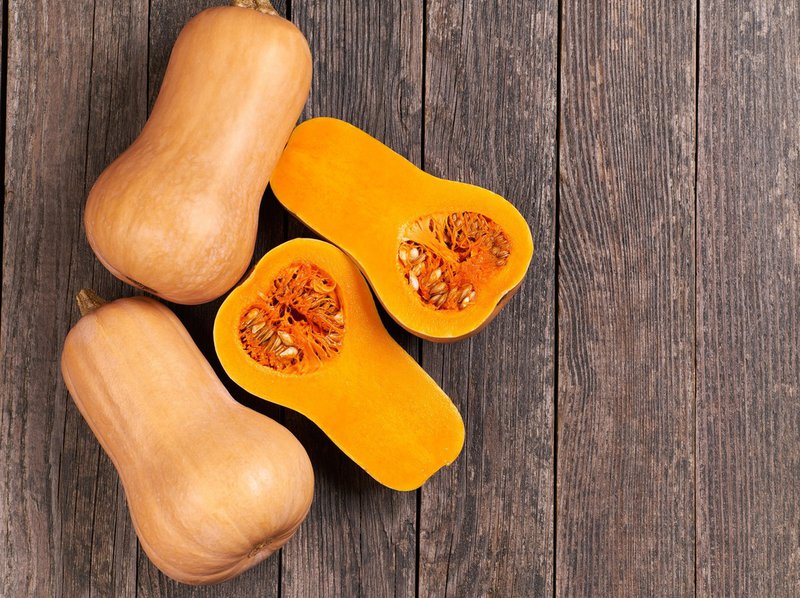Dogs are omnivorous, and you may have noticed your furry friend isn’t picky about eating more than just meat. Fruits, veggies, and even some drinks are all on the menu for your canine. But can dogs have squash?
Yes, dogs can have squash, and this treat is quite nourishing for them too. Squash contains essential vitamins and minerals, such as vitamins A, B6, C, calcium, and magnesium. With so many health benefits, your dog can only benefit from regularly eating squash.
In this article, we’ll review the many benefits of squash and the safe amount to give your dog. It’s also important to know what type of squash is safe and how best to prepare this healthy snack. But first, let’s start with what parts of the squash are and are not safe for dogs.
Is Squash Safe For Dogs To Eat?
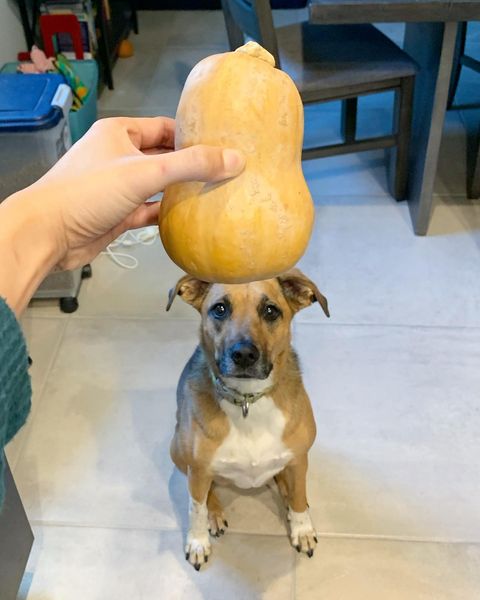
Yes, squash is safe for dogs to eat as long as you do not let your doggie swallow too many seeds. Overeating seeds may cause blockage and constipation. However, always chop the squash into bite-size portions and discard any firm rinds to avoid a choking hazard.
Luckily, a dog’s digestive system can handle many foods, including fruits and veggies. With squash’s many health benefits, such as boosting immune function, preventing skin problems, and helping eyesight, your pup should regularly enjoy this treat.
How Much Squash Can A Dog Eat?
Dogs can have squash, but not in excess. Two tablespoons are enough for toy and medium-sized dogs. Meanwhile, larger canines can have more.
Treats like squash shouldn’t make up over 10% of your dog’s diet. Fruits and veggies may complement your furry friend’s diet, but your dog needs other food to maintain a balanced diet. Generally, food intake for dogs depends on their size, weight, and age.
How Do I Prepare Squash For Dogs?
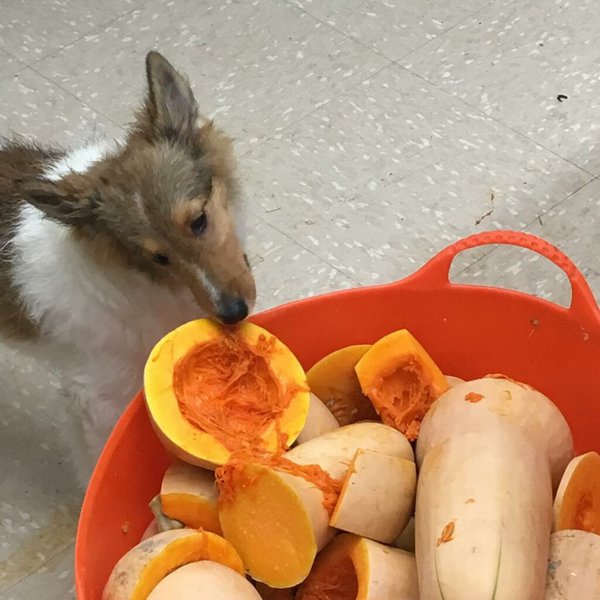
To prepare squash for dogs, remove the seeds, peel the skin, and wash. The preparation method depends on whether you serve the squash raw or cooked.
Here are simple and general steps to prepare squash for dogs.
Wash The Fruit
Squash can come with soil, microbes, and preservatives, so wash produce properly. Using a soft brush, scrub the squash under running water.
Peel The Bark Or Skin
You need to peel off the bark or skin when serving squash raw. Squash bark may be too chewy and problematic for digestion.
Remove The Seeds
Unless using a blender or juicer to make a puree, remove the seeds from the squash. These seeds are often rigid and difficult to digest. Dogs should not eat many seeds.
Cut Or Grind
Most squash needs to be cut into small pieces. This allows your canine friend to eat without choking. Blending is another alternative if you prefer to serve a puree.
Cook The Squash
Cooking makes the fruit soft and tender for canines. Boiling is the preferred way of cooking squash.
Butternut squash is an example of squash that needs to be cooked. Avoid adding spices or seasonings. The simpler it is, the better to keep your dog’s digestion functioning properly.
Serve In Measured Quantity
You can serve your dog squash alone or add it to other meals, but remember to serve it in small treat-like portions.
What Kind Of Squash Can Dogs Eat?
Dogs can eat any kind of squash if prepared properly, as discussed earlier.
Here are three examples of popular squash you can serve to your four-legged furry friend:
Butternut Squash
Butternut squash is a tan bulb fruit with tough skin. Thankfully, the flesh is more succulent and contains several beneficial nutrients for your dog.
For instance, butternut squash promotes bone and teeth health of canines due to the adequate presence of calcium and phosphorus.
However, due to its tough skin and fibrous characteristics, you need to cook butternut squash before feeding it to dogs. You can prepare it by steaming, baking, or boiling.
Spaghetti Squash
The name comes from the spaghetti-like strands that form inside the pod during cooking. Your dog benefits from eating this fruit dense in essential nutrients. These include several essential vitamins, minerals, proteins, and fats, to mention a few.
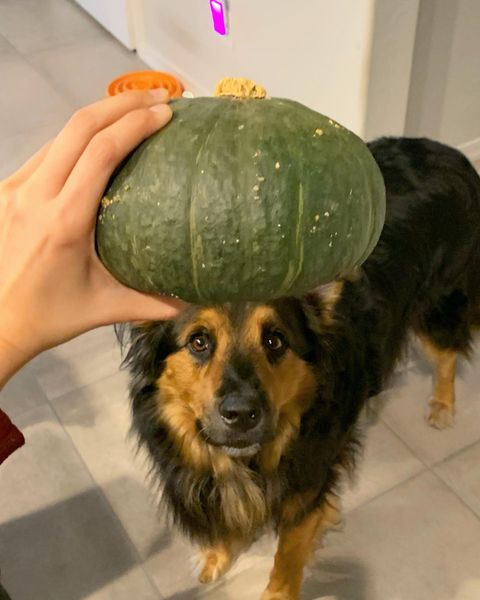
Acorn Squash
Sometimes called pepper squash, acorn squash has characteristic longitudinal ridges on the outside and yellowish-orange flesh inside. Acorn squash also contains several vitamins, including vitamin B6, that help maintain your dog’s coat.
Can Dogs Eat Squash Seeds?
No, dogs should not eat many squash seeds. Although a few pose no danger, several can cause stomach upset and obstruction of the intestinal tract from accumulation.
Undoubtedly, squash seeds are also nutritious. However, if you want to give them to your dog, thoroughly grind them with the squash for a puree. Otherwise, remove seeds before giving your dog some squash.
Can Dogs Eat Squash Skin?
No, peel the squash to avoid its skin in your canine’s diet.
Most squashes have tough skin, making them difficult to chew and digest. So we recommend peeling the skin and feeding only the fruit’s flesh to your dog.
What Are The Benefits Of Squash For Dogs?
Fruits and veggies make the perfect nutritional supplement for canines. Squash should be on your list for several reasons. Here are three ways squash is beneficial to dogs.
Aids Digestion
The high fiber content of squash makes them beneficial to your dog’s digestive tract. Fiber breaks down to fatty acids through the actions of helpful bacteria in the intestine. These fatty acids line the colon and prevent harmful bacteria from growing in your dog’s gut.
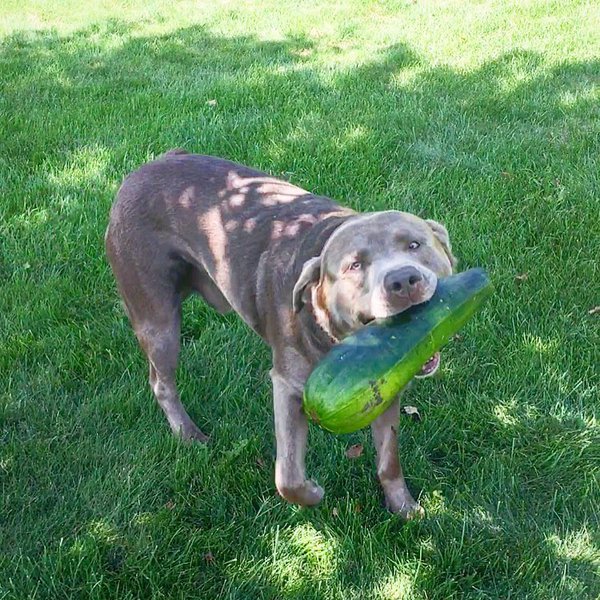
Manages Weight Gain
Squash contains low calories but high fiber, making your dog feel full without too much food. Again, your canine won’t feel hungry as often with a high-fiber diet.
That is why these fruits are ideal for dog owners who want to control their canine’s weight. Adding these fruits to your doggie’s diet is an effective way of preventing weight gain and managing obese dogs.
High In Vitamins And Minerals
The type of squash varies, but each type contains essential vitamins and minerals for canine development. Among them are vitamins A, B, C, and D. Some minerals include magnesium, phosphorus, potassium, calcium, and iron.
Is Squash Good For Dogs With Kidney Disease?
Yes, squash is good for dogs with kidney disease. In addition to water, vets recommend foods low in calories but high in fiber and vitamins for dogs with kidney disease.
Squash is low in calories, dense with vitamins and minerals, and high in fiber. These fruits meet the requirements in every way, making them perfect for a dog with kidney disease.
Is Squash A Laxative For Dogs?
Yes, squash aids bowel movements, making it a potent laxative for dogs.
Squash contains both soluble and insoluble fiber. Insoluble fiber draws moisture into excreta, thereby adding some bulk to it. That makes it easier to eject from the body.

Can Squash Help My Dog Poop?
Yes, squash helps your dog poop easily.
If your dog has difficulty passing stool, adding some fiber to their food helps ease bowel movements. The insoluble fiber in squash adds some mass to the fecal material. Consequently, that improves the bowel movement of your canine friend.
Is Squash Good For Dogs With Pancreatitis?
Yes, squash is good for dogs with pancreatitis. Squash fulfills several dietary requirements for canines with pancreatitis. Diets for dogs with pancreatitis must be low in fat, and squash has minimal fat.
Also, a canine’s pancreatitis diet must be high in fiber and rich in vitamins and minerals. Though nutritional values differ slightly by squash type, generally, all squash is generously fibrous and rich in vitamins and minerals.
When Is Squash Bad For Dogs?
Squash is unhealthy for dogs only when not properly prepared before feeding.
Feeding dogs with natural food requires caution due to the potential presence of dangerous microbes. So, it’s important to wash the squash, remove seeds and tough rinds, and peel off the skin.
To ease digestion, it helps to cook the squash to soften it. Also, chop the squash into chewable pieces to avoid a choking hazard.
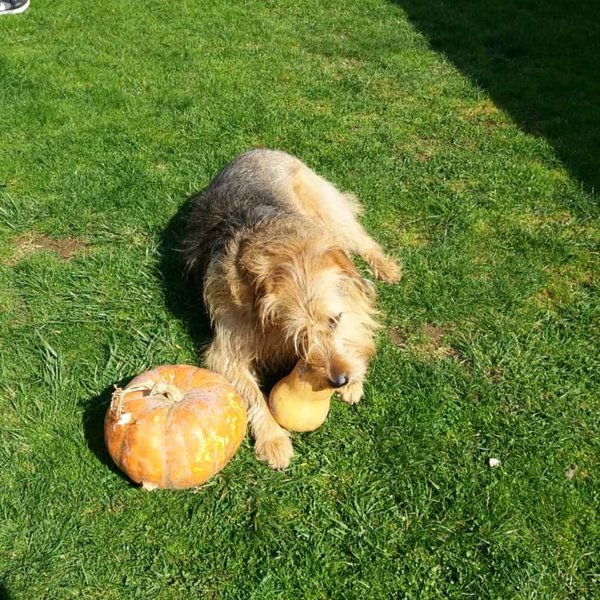
Can Squash Upset Dogs’ Stomach?
Yes, squash can cause stomach upset for dogs, especially when they overeat it.
Too much fiber intake can cause bloating of your canine’s belly. So, you need to keep the quantity reasonable even when Fido’s tail is wagging for more.
Are There Risks Of Feeding Dogs Squash?
The most significant risk of feeding dogs squash is digestion difficulty.
You can avoid this by properly preparing it before feeding. Remove the skin and seeds, and cook to tenderize.
If your dog has a sensitive stomach or has had adverse reactions to squash, avoid feeding them raw squash to avoid vomiting or diarrhea. Also, you should start with small portions if your dog hasn’t tried squash. That way, you can see how your dog tolerates squash.

